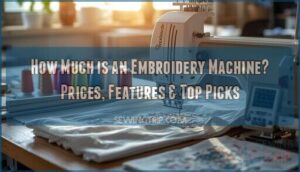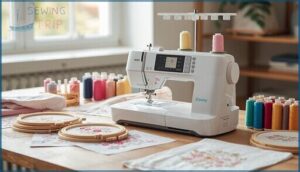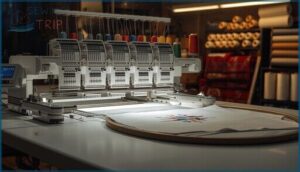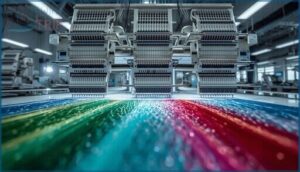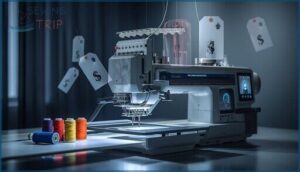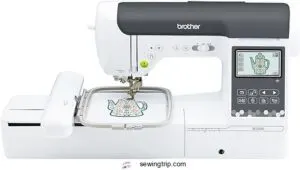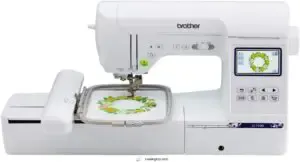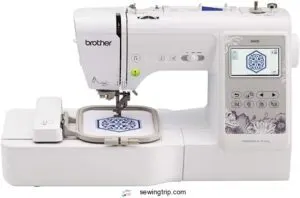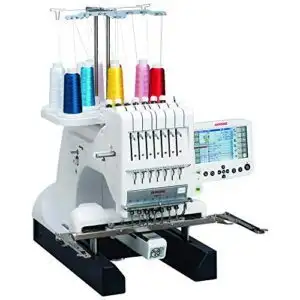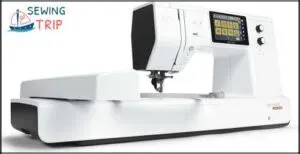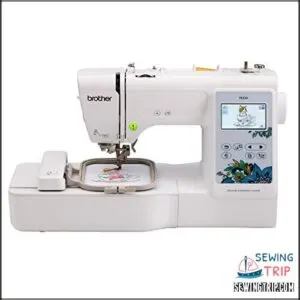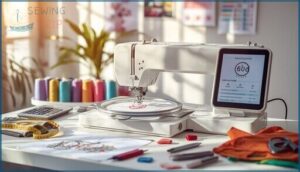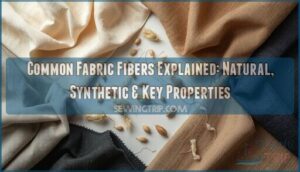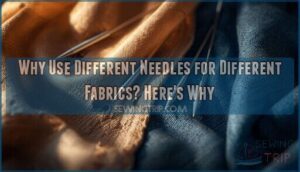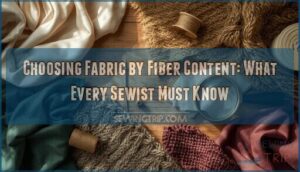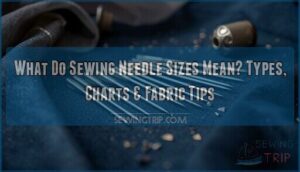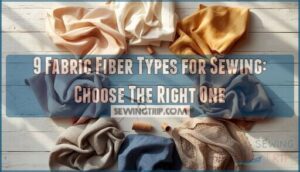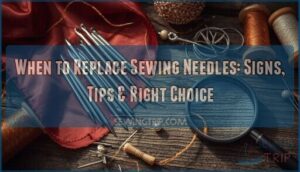This site is supported by our readers. We may earn a commission, at no cost to you, if you purchase through links.
Six thousand dollars can buy a reliable used car—or a single commercial embroidery machine. Surprised? Most people are, until they start shopping for serious equipment. The price range for embroidery machines stretches from a couple hundred dollars for basic home models to more than sixty grand for industrial workhorses.
If you’re weighing how much is an embroidery machine worth to your business, it’s not just the sticker price that matters. Features, brand reputation, and long-term costs all shape your decision. Understanding the landscape means you’ll know where your money goes—and how to get the best value for your needs.
Table Of Contents
Key Takeaways
- Embroidery machines range from $200 for basic home models to over $60,000 for industrial multi-head systems, with mid-range prosumer machines landing between $3,000 and $10,000 depending on features like needle count and embroidery area size.
- The real cost extends beyond the purchase price—you’ll spend $150 to $500 annually on accessories, $250 to $600 yearly on consumables like thread and stabilizers, and potentially $2,000 to $3,500 for premium digitizing software if you’re running a business.
- Multi-needle machines justify their higher price through speed and automation, stitching 800–1,200 times per minute with automatic color changes, while single-needle models require manual thread swaps but cost 70–90% less upfront.
- High-volume embroidery businesses can achieve payback in just 1.4 months with annual returns up to 847%, making the investment worthwhile if you match machine capabilities to your actual production needs rather than buying based on features alone.
Average Embroidery Machine Prices Explained
Embroidery machine prices span a wide range, from a few hundred dollars to well over sixty thousand. Your investment depends on whether you’re stitching names on baby blankets or running a full-scale apparel business.
Let’s break down what you can expect to spend at each level.
Entry-Level Home Embroidery Machine Costs
You’ll find entry-level embroidery machine models priced between $200 and $700, with popular starter machine prices like the Brother PE535 at $379–$480. These beginner embroidery projects-ready units usually include 50–80 built-in designs and 4″ x 4″ embroidery fields. When accessory budgeting, add $15–$50 for extra hoops.
Commercial grade machines are available starting at $15,000 for heavy-duty use. Refurbished options can save you 10–40%, making feature cost analysis essential before your brand entry points decision.
Mid-Range and Prosumer Price Brackets
When you’re ready to step up, mid-range embroidery machines land between $3,000 and $10,000. These models—like the Ricoma EM-1010 or Brother PR1050X—offer multi-needle setups, larger embroidery areas, and faster production speeds. One key benefit is that Ricoma machines offer support for businesses of all sizes.
Consider:
- Feature Prioritization for workflow
- Scalability Options for growth
- Brand Comparison and Used Market for better ROI Horizon
Quality embroidery machines pay off.
Commercial and Industrial Machine Pricing
Once you cross $10,000, you’re shopping for commercial embroidery machines built for business. Entry-level multi-needle embroidery machine models start around $12,000, while multi-head pricing jumps to $50,000–$250,000 for industrial applications. Automation costs and brand premiums (Tajima, Happy) add 25–40% more than budget embroidery machine brands. Scalability factors matter—these quality embroidery machines deliver ROI when production volume justifies the investment.
| Machine Type | Price Range |
|---|---|
| Single-head commercial | $8,000–$25,000 |
| Multi-head industrial | $50,000–$250,000+ |
| Premium brands (Tajima) | +25–40% markup |
Key Factors Impacting Embroidery Machine Cost
You’ve seen the price ranges, but understanding what drives those numbers helps you make a smarter choice. Several factors can push a machine from a few hundred dollars to well over ten thousand.
Let’s break down the main elements that shape what you’ll actually pay.
Brand Reputation and Influence
Brand Loyalty plays a major role in embroidery machine pricing. Established embroidery machine brands like Brother, Janome, and Baby Lock command up to 50% price premiums thanks to Perceived Quality and Customer Trust.
You’ll find that 85% of buyers stick with recognized machine brands for reliability. This Market Dominance means better Service Impact through warranty support and accessible parts, but you’re paying 25–30% more upfront for that peace of mind.
Number of Needles (Single Vs Multi-Needle)
How does needle count shape your budget? Single-needle embroidery machines run $300 to $1,500, while multi-needle models jump to $5,000–$60,000.
Here’s the cost comparison breakdown:
- Automation Efficiency: Multi-needle machines stitch 800–1,200 per minute with automatic color changes
- Project Suitability: Single-needle fits home use; multi-needle accommodates bulk orders
- Maintenance Differences: Commercial units need $2,000–$4,500 annual upkeep
- Needle Count Impact: Multi-needle machines dominated 68.7% of 2024 revenue
Built-in Features and Advanced Technology
Touchscreen displays and design libraries boost machine prices by $200–$800. You’ll find models with 80 to over 1,000 builtin designs and Wi-Fi connectivity in 60% of 2025 machines.
AI automation and error detection cut defect rates by 19% while reducing downtime 41%. Computerized embroidery with sophisticated sewing technology means fewer manual adjustments and faster project turnarounds for your business.
Size of Embroidery Area and Hoops
How does embroidery area affect your wallet? Larger hoops mean higher prices. Entry-level machines with 4×4-inch minimums cost $250–$1,500, while mid-range units offering 5×7 to 6×10-inch sewing field limits run $1,000–$10,000. Multi-hoop compatibility adds versatility, and the 5×7 size dominates small business use. Commercial models with 9×14-inch or bigger embroidery machine design areas often exceed $10,000.
Top Embroidery Machines and Their Prices
Now that you understand what drives embroidery machine pricing, let’s look at specific models and what they actually cost.
I’ve selected machines across different price points that represent solid value in today’s market. These picks include everything from budget-friendly starter machines to professional multi-needle systems.
1. Brother SE2000 Sewing and Embroidery Machine
If you want value without compromising capability, the Brother SE2000 sewing and embroidery machine hits a sweet spot at $1,399.99. This combo machine delivers 193 built-in embroidery designs, a 5″ x 7″ embroidery field, and wireless LAN connectivity for easy file transfers.
User reviews consistently praise its 4.6-star performance, highlighting the 3.7″ touchscreen and 650-stitches-per-minute speed. Technical specs include 241 sewing stitches and automatic jump stitch trimming.
Bundle options can push the price to $1,599.99, but the SE2000 features justify the investment for serious hobbyists and small business owners alike.
Best For: Home sewists and embroidery enthusiasts who want a reliable combo machine with wireless features and a larger embroidery area without breaking the bank.
- 5″ x 7″ embroidery field gives you more room for creative designs compared to smaller 4″ x 4″ models, plus wireless file transfer makes it easy to load custom patterns.
- Fast stitching speeds (850 spm sewing, 650 spm embroidery) with automatic jump stitch trimming saves time and reduces manual thread cutting.
- Strong user ratings at 4.6 stars with 241 sewing stitches and 193 embroidery designs built in, making it versatile for different projects right out of the box.
- Some users report thread breakage issues and the auto-threader can be finicky, with occasional durability concerns on plastic components.
- Limited font variety out of the box, and threading can feel tight during setup for beginners still learning the machine.
- No carrying case included and requires a voltage adapter for international use, plus there’s a learning curve for embroidery features.
2. Brother SE1900 Sewing Embroidery Machine
Priced between $3,070 and $3,190, the SE1900 model balances power with affordability. This Brother embroidery machine features 138 built-in designs and 240 sewing stitches, backed by an impressive 25-year limited warranty with 1-year parts coverage.
Technical specifications include a 5″ x 7″ embroidery area and 850 stitches per minute. SE1900 features like USB design import suit home-based businesses.
Consider peripheral costs—thread kits run $22.94 to $48.99, stabilizer rolls cost $24.99, and needle packs range from $7.99 to $14.99 for ongoing sewing machine operation.
Best For: Home sewers and small business owners who need a versatile machine for both everyday sewing projects and professional-quality embroidery work, with room to grow into more advanced techniques.
- Large 5″ x 7″ embroidery area with 138 built-in designs and USB import capability gives you serious creative flexibility for custom projects and monogramming work.
- Impressive 25-year limited warranty with lifetime phone support provides long-term peace of mind that’s rare in this price range.
- Fast operation at 850 stitches per minute for sewing and 650 for embroidery means you can finish projects efficiently without sacrificing quality.
- Premium pricing between $3,070-$3,190 puts it out of reach for casual hobbyists or beginners just testing the waters.
- Ongoing costs add up quickly with thread kits ($23-$49), stabilizer rolls ($25), and other consumables needed for regular embroidery work.
- Can be loud during embroidery mode and struggles with thick materials, so it’s not ideal if you work with heavy fabrics or need a quieter workspace.
3. Brother SE600 Sewing Embroidery Machine
Budget-conscious entrepreneurs will find the Brother SE600 sewing machine priced between $250 and $499, delivering great value for beginners. This embroidery machine for beginners offers 80 built-in designs, 103 stitches, and a 4″ x 4″ embroidery field.
SE600 features include USB design import and a 3.2″ touchscreen for pattern editing. Machine durability stands out—users report over 4.8 million cumulative stitches across five years.
Stitch quality reaches 710 stitches per minute, while the 25-year warranty reinforces this value proposition for home-based operations.
Best For: Hobby sewers and small business starters who want both sewing and embroidery capabilities without spending over $500.
- Includes 80 embroidery designs and 103 stitches right out of the box, plus you can import unlimited custom patterns via USB.
- Proven longevity with users reporting over 4.8 million stitches across five years and a 25-year warranty for peace of mind.
- Fast stitching at 710 stitches per minute with an easy-to-use 3.2″ touchscreen that makes editing patterns simple.
- The 4″ x 4″ embroidery area is pretty small, so you’re limited on larger projects.
- It’s bulky at over 14 pounds, which makes storage and moving it around a bit of a hassle.
- Not built for heavy commercial use—you’ll likely need professional servicing after a few million stitches.
4. Janome MB-7 Seven Needle Embroidery
If you’re ready to step up production, the Janome MB-7 seven-needle embroidery machine generally costs between $5,999 and $8,999. This multi-needle embroidery machine delivers 800 stitches per minute across a 9.4″ x 7.9″ embroidery field—noticeably larger than entry models.
MB-7 features include 50 built-in designs, a 5.7″ remote computer screen, and compatibility with industry-standard formats like.dst and.jef+.
Operating considerations include routine oiling and monthly sensor calibration, while maintenance costs run about $45 per hour for repairs. The 25-year warranty protects your investment in this serious production tool.
Best For: Small businesses, professional embroiderers, or serious hobbyists who need efficient multi-color embroidery production without investing in full industrial equipment.
- Seven-needle setup eliminates constant thread changes, letting you breeze through multi-color designs at 800 stitches per minute.
- Large 9.4″ x 7.9″ embroidery field handles bigger projects like jackets and home decor, with compatibility for both Janome and Tajima hoops.
- Strong 25-year warranty on internal parts plus support for industry-standard file formats (.dst, .jef) means you’re covered for the long haul.
- Some users report ongoing thread tension problems and difficulty threading the bobbin, which can slow down workflow.
- Requires regular hands-on maintenance including daily oiling, weekly cleaning, and monthly calibration to keep it running smoothly.
- No automatic threading feature, and the $5,999–$8,999 price tag plus potential repair costs ($45/hour labor, $89 diagnostic fee) add up quickly.
5. Bernette Computerized Sewing Machine
The Bernette B79 sewing machine bridges the gap between hobbyist and professional at $2,299 to $2,399. This computerized embroidery machine delivers 500 stitches through a 5-inch color touchscreen, dual-feed technology, and three embroidery hoops. You’ll get quilting, home décor, and custom apparel capability in one unit.
Market trends show 4–5% growth for these machine models through 2030. Dealers generally bundle bonus accessories and warranties with purchase.
Entry-level Bernette pricing starts around $749 for the B38, offering adaptable machine features as your business expands.
Best For: Sewers and embroidery enthusiasts looking for a versatile machine that handles everything from quilting to custom apparel without needing separate equipment.
- 500 built-in stitches and three embroidery hoops give you serious creative range for both sewing and embroidery projects.
- Dual-feed technology keeps fabric moving evenly, which means cleaner results on tricky materials.
- The 5-inch color touchscreen makes navigation way easier than button-based machines, especially when you’re switching between functions.
- Startup is slow and the menu system takes time to learn—expect a learning curve even if you’ve used other machines.
- Threading the lower bobbin can be frustrating, and the user manual doesn’t always help clarify the process.
- Struggles with thick layers or heavy-duty fabrics, so it’s not ideal if you’re working with upholstery or canvas regularly.
6. Brother PE535 Embroidery Machine USB
You’ll find the Brother PE535 embroidery machine priced between $400 and $495, making it one of the most accessible Brother embroidery machines for newcomers. This PE535 model includes 80 embroidery designs, a USB port for custom uploads, and a 4″ x 4″ work area.
User reviews consistently rate it 4.5 stars for beginner friendliness, though design limitations exist with the smaller hoop size.
Warranty details cover 25 years on the frame, 5 years on electronics, and 1 year on parts.
Best For: Beginners and hobbyists looking for an affordable, easy-to-use embroidery machine for small personalization projects like monograms, logos, and custom gifts.
- Simple setup with automatic needle threader, drop-in bobbin, and touchscreen interface that makes it approachable for first-time users
- USB port lets you upload custom designs beyond the 80 built-in options, giving you room to grow creatively
- Strong warranty coverage with 25 years on the frame, 5 years on electronics, and free lifetime tech support
- The 4″ x 4″ embroidery area limits you to smaller projects and rules out large designs or full garment work
- Changing thread colors manually can slow things down on multi-color patterns
- You’ll need to budget extra if you want advanced digitizing software to create your own custom designs from scratch
Additional Costs of Owning an Embroidery Machine
Buying the machine is just the beginning. You’ll need to budget for accessories, software, routine upkeep, and all the thread and bobbins your projects will consume.
Let’s break down what these ongoing expenses actually look like.
Essential Accessories and Hoops
Your embroidery machine accessories can add another $150 to $500 annually to your operating costs. Beyond the machine itself, you’ll need to stock up on essential tools that directly impact your output quality and embroidery area capabilities:
- Hoops in multiple sizes – Basic hoop sizes range from $39 to $50, while magnetic hoops cost $45 to $90 for faster setup
- Needle types and stabilizer qualities – Replace needles every 6-8 hours; quality stabilizers protect fabric integrity
- Thread management and laser tracing tools – Organization systems prevent tangling, and precision placement devices run around $161
Hoop material durability matters when you’re running high-volume projects.
Software and Design Upload Expenses
Beyond accessories, software costs and digitizing fees demand serious budget attention. Premium embroidery machine software like Wilcom starts at $3,499, while Hatch offers subscriptions at $1.50 daily. Each design upload runs $5–$10, and pattern prices range from $12 to $35 per download. Software compatibility matters—update expenses add $350–$600 yearly for support contracts on custom designs.
| Software Type | Cost Range | Best For |
|---|---|---|
| Premium (Wilcom, Tajima) | $2,000–$3,499 one-time | Commercial studios |
| Mid-Range (Chroma) | $599–$1,999 lifetime | Growing businesses |
| Subscription (Hatch) | $1.50/day or $159–$349/year | Flexible users |
Maintenance, Calibration, and Repairs
How often should you service your equipment? Preventive maintenance frequency for commercial embroidery machines runs every 6 to 12 months, while home units need annual checks.
Basic tune-ups cost $50–$85, but the calibration procedure importance can’t be overstated—timing adjustments run $75–$125 and fix 63% of skipped stitches.
Regular servicing extends lifespan and performance by five years and cuts repair cost impact 40% over time.
Thread, Bobbin, and Consumable Costs
Before you even sew your first design, thread consumption rates deserve attention—you’ll burn through about 6 meters of needle thread per 1,000 stitches.
Add bobbin thread types, stabilizer material costs, and annual consumables expenditure quickly climbs to $6,000–$24,000 for busy shops.
Smart bulk sourcing strategies slash those numbers, so stock up on thread colors, accessories, and stabilizers when prices dip.
Tips for Choosing The Right Embroidery Machine
Picking the right embroidery machine isn’t just about price—it’s about matching your goals with the features you’ll actually use. You need to weigh your budget against what you want to create, whether that’s personal projects or a full-blown business.
Here’s how to make a smart choice that pays off in the long run.
Setting a Realistic Budget
Choosing an embroidery machine starts with understanding your financial picture and hidden costs beyond the price tag. Budgeting factors include initial purchase, accessories, and long-term expenses.
- Entry-level hobbyists: $250–$700 for basic machine features and classes
- Small business operators: $3,000–$10,000 for mid-range embroidery machines
- Commercial setups: $12,000+ for industrial-grade equipment
- Five-year ownership: Add $10,247–$17,821 for maintenance, consumables, and upgrades
Financing options and upgrade planning help cost justification matches your embroidery goals.
Prioritizing Features for Personal or Business Use
Your needs drive which embroidery machine features matter most. Home users generally choose single-needle machines with 4×4 inch areas for custom designs and gifts. Business operators need multi-needle systems—62% select 10+ needles for efficiency.
Consider project complexity, skill level, and space requirements. Touchscreen interfaces appeared in 64% of 2025 small business machines. Match machine features and classes to your production volume and growth plans.
Evaluating Long-Term Value and Return on Investment
Beyond sticker price, your embroidery machine’s true worth emerges through ROI benchmarks and total ownership costs. High-volume businesses see payback in 1.4 months with 847% annual returns, while maintenance impact generally runs 5–10% of purchase price yearly.
An embroidery machine can deliver payback in just 1.4 months and annual returns up to 847% for high-volume businesses
Consider these factors:
- Revenue scaling potential—$30,000 to $250,000 annually
- Consumable expenses averaging $250–$600 per year
- Resale value retention for well-maintained units
Machine selection determines your bottom line.
Where to Find The Best Deals
Your machine selection unlocks savings when you know where to shop. Online retailers like Amazon and Wayfair list embroidery machines at $400–$515, often with free shipping and bundle offers. Seasonal sales during Black Friday or year-end drop prices 30%.
Local dealers provide hands-on support and loyalty discounts. Price tools and online reviews help you compare deals fast.
Frequently Asked Questions (FAQs)
Which embroidery machine is best?
Funny how the “best” embroidery machine shifts with your User Skill Level and Project Complexity.
For beginners, the Brother SE600 stands out for ease of use. Experienced users lean toward Janome MB-7 for design versatility and embroidery machine performance.
How much does an embroidery machine cost?
Embroidery machine prices range from $200 to $30,000 or more, depending on whether they are entry-level or commercial models. Pricing factors include brand, machine tiers, features, and hidden costs.
Smart budgeting tips and value assessment can help you choose quality machines suitable for business use.
Where can I buy an embroidery machine?
Picture a new shop owner in Los Angeles comparing options: you’ll find Brother embroidery machines at Authorized Dealers like SewingMachinesPlus, Online Marketplaces such as Amazon, Wholesale Suppliers, Boutique Retailers, and Local Networks—all offering customer service and SoCal locations.
Who makes the least expensive embroidery machines?
Brother embroidery machines consistently lead Budget Brands for entry-level features and user-friendliness. Their PE535 and SE600 models offer reliable performance at the lowest price points.
For beginner-friendly options and long-term costs, Brother stands out in any price comparison.
Is an embroidery business worth it?
If you manage operational risks and market saturation, an embroidery business can be worth it. Profit margins average 15–20%, but scalability challenges and startup capital matter. Success hinges on smart use of embroidery machines for custom designs and apparel projects.
How much is 1000 stitches in embroidery?
Most shops charge $1 to $3 per 1,000 stitches for embroidery projects. Pricing factors like order volume, thread costs, and location impact your final bill.
Bulk orders often drop rates below $1 per thousand stitches.
Is embroidery a cheap hobby?
Yes, embroidery is a cheap hobby. Hand embroidery costs under $25 to start with basic needles, hoops, and thread. Even machine embroidery beginners can launch beginner-friendly DIY projects for $250-$1,
How much does it cost to start an embroidery business?
Starting an embroidery business generally requires a $5,000 to $20,000 total investment. Your startup cost breakdown includes the embroidery machine for business ($379 to $10,000), digitizing software, hoops, thread, and workspace setup for custom apparel projects.
Can you rent an embroidery machine?
You can rent embroidery machines through libraries, makerspaces, and online rent-to-own programs. Hourly rates run $14 to $50, while monthly leases start around $199 for commercial models.
Are second-hand embroidery machines worth it?
Pre-owned units can be a smart move if you’re diligent. Refurbished benefits include savings up to 57%, but maintenance history matters—check service records carefully.
Satisfaction rates average 5/5 when buyers vet used embroidery machine conditions thoroughly.
Conclusion
Knowledge is half the battle—action closes the deal. Now that you know how much an embroidery machine costs and what drives those prices, you can shop with confidence.
Match your budget to your goals, whether that’s a basic home setup or a multi-needle powerhouse. Factor in software, hoops, and thread costs too.
The right machine isn’t the most expensive one—it’s the one that pays for itself through steady work and reliable results.
- https://maggieframestore.com/blogs/maggieframe-news/how-much-are-embroidery-machines-comprehensive-price-guide-buying-strategies
- https://www.hooptalent.com/blogs/news/embroidery-machine-costs-your-complete-pricing-and-buying-guide
- https://www.archivemarketresearch.com/reports/home-embroidery-equipment-501003
- https://www.cognitivemarketresearch.com/embroidery-machine-market-report
- https://www.blankstyle.com/blog/2024/02/how-much-is-an-embroidery-machine/

